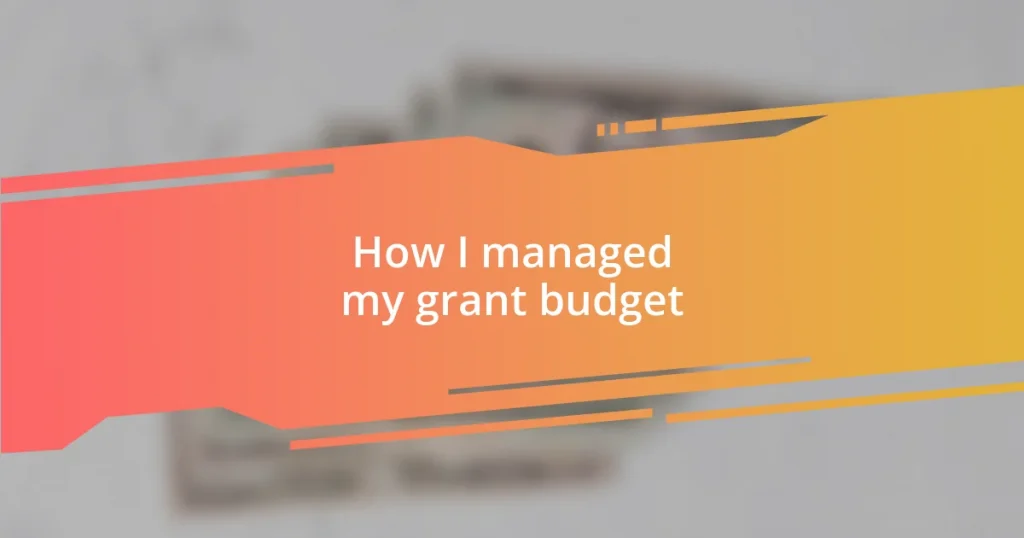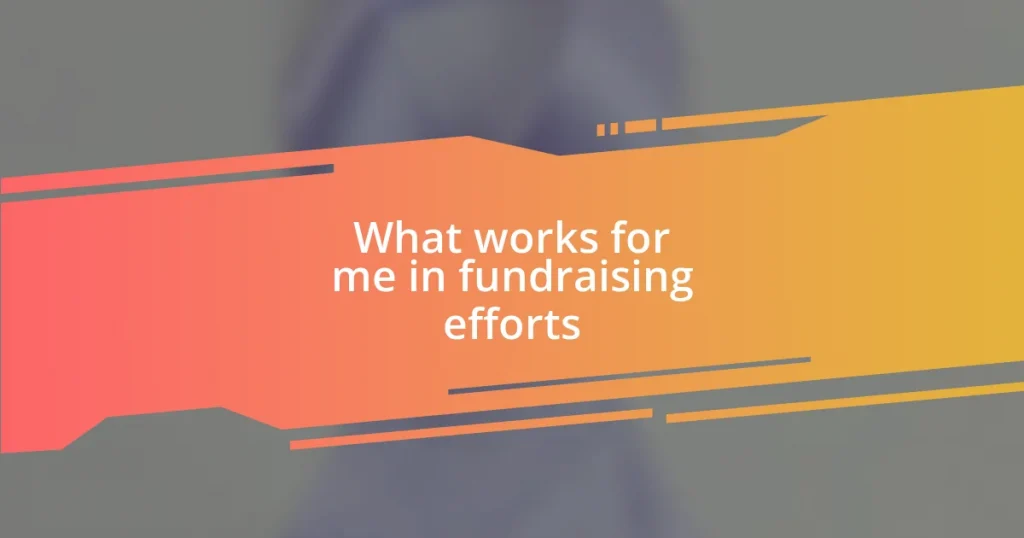Key takeaways:
- A well-structured grant budget combines direct and indirect costs, effectively communicating the project’s value and instilling confidence in funders.
- Setting clear budget goals and regularly tracking expenses allows for effective allocation of funds and necessary adjustments, leading to strategic financial management.
- Transparency in reporting financial outcomes fosters trust with stakeholders and promotes accountability among the team, enhancing overall project performance.
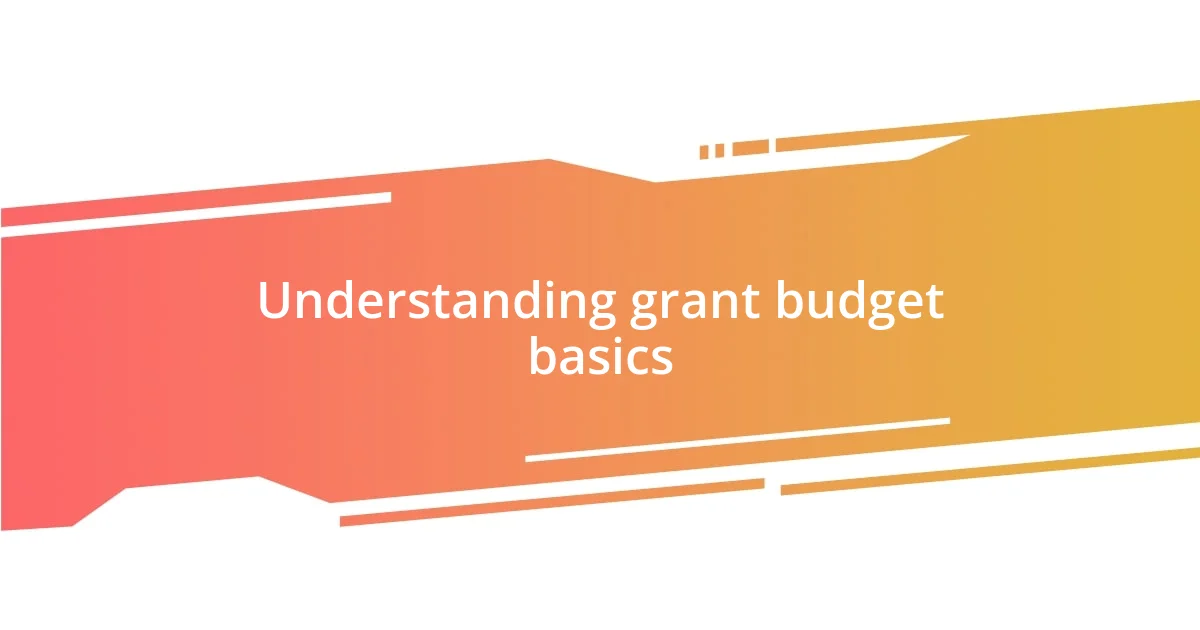
Understanding grant budget basics
Understanding grant budgets can initially seem daunting, but once you break it down, it starts to make sense. I remember the first time I attempted to draft a budget; I felt overwhelmed by numbers and spreadsheets. Have you ever had a similar experience? The key is to view the budget as a story about your project, where each line item illustrates how you’ll use the funds to achieve your goals.
Every grant budget typically consists of direct and indirect costs. Direct costs are easy to identify, such as salaries and equipment, but indirect costs—like overhead and administrative support—can be trickier. I learned this the hard way when I overlooked indirect costs in my first project. It taught me that every component of the budget reflects the reality of the project’s needs.
It’s essential to remember that a well-managed budget does more than just track expenses; it helps communicate your project’s value. I often reflect on how a clear budget can instill confidence in funders, reinforcing that I’m responsible and prepared. Have you ever felt that sense of security when presenting a detailed budget? It’s a powerful tool that not only guides your spending but also showcases your dedication to your project’s success.
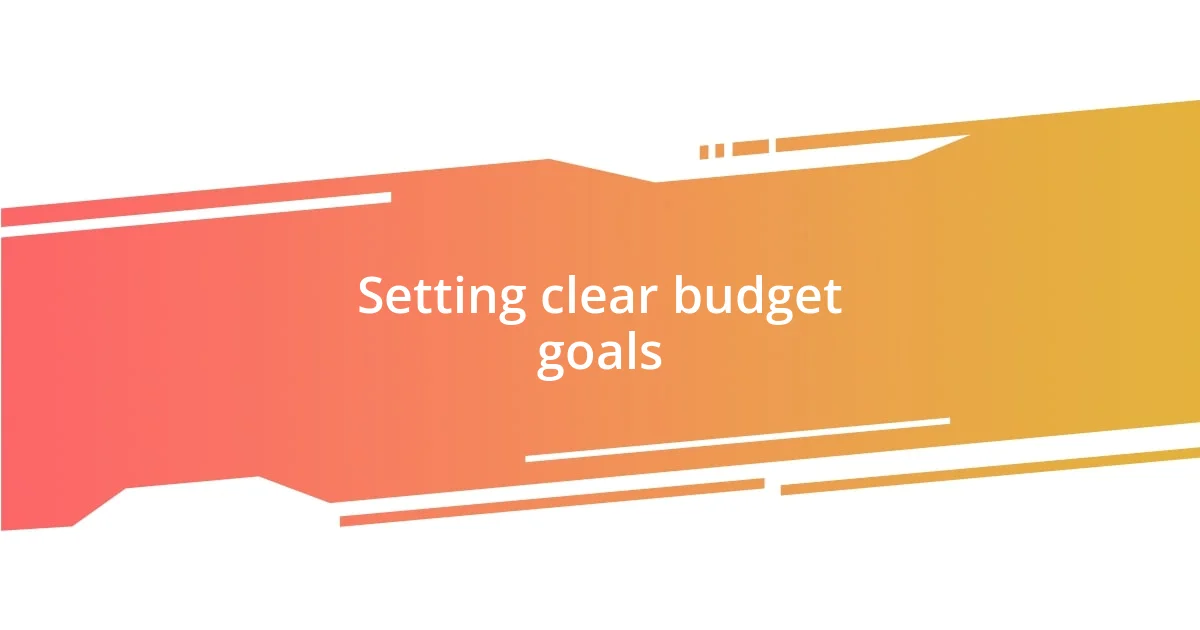
Setting clear budget goals
Setting clear budget goals is a cornerstone of effective budget management. I remember how pivotal it was for me during my early projects to articulate specific financial objectives before diving into numbers. It’s like setting a destination before embarking on a journey—without clear goals, you risk wandering aimlessly. This clarity not only focuses your spending but also enhances communication with stakeholders about where funds will be allocated and why.
To define clear budget goals, consider the following steps:
- Identify Project Priorities: Determine which aspects of your project are most critical.
- Set Specific Financial Targets: Establish realistic figures for each category of expenses.
- Involve Your Team: Collaborate with your team to gain diverse perspectives on budget needs.
- Adjust for Flexibility: Allow room for unexpected changes by setting aside contingency funds.
- Use Historical Data: Reference past budgets to help inform your current goals.
Setting these goals helped me feel grounded and strategic, rather than overwhelmed. It transformed budgeting from a daunting task into an empowering process that supported my project’s vision.
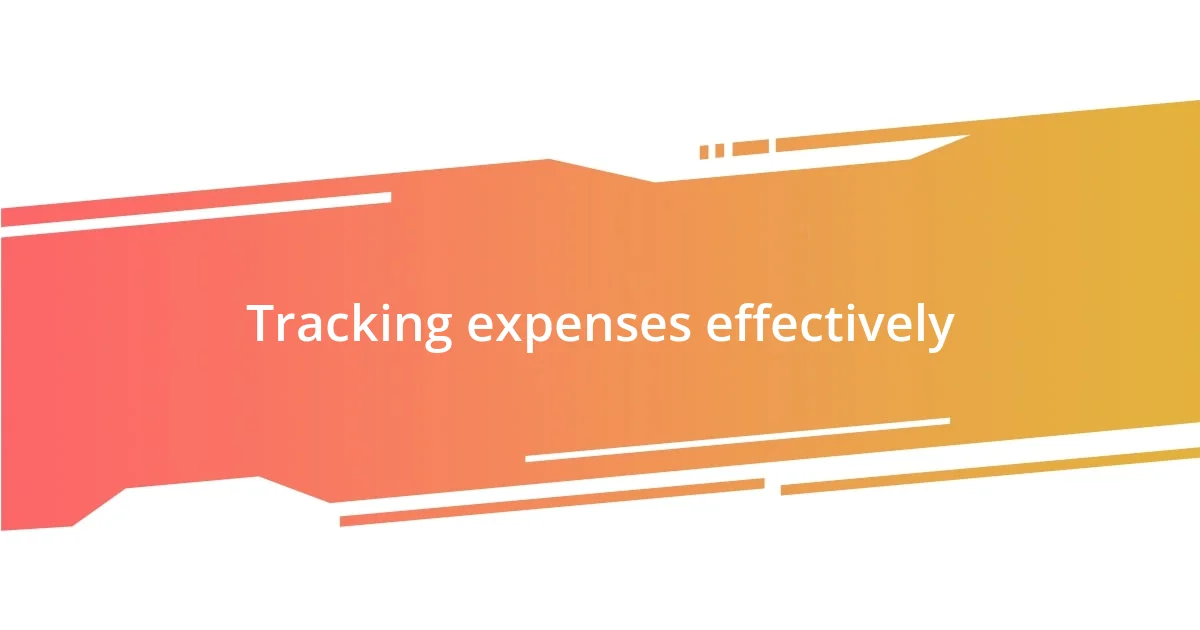
Tracking expenses effectively
Tracking expenses is an ongoing journey, and I’ve found that using spreadsheets effectively is an invaluable tool. In my experience, organizing expenses in a well-structured spreadsheet can turn chaos into clarity. For example, I once created a simple spending tracker that allowed me to categorize each expense—this helped me see where funds were going and make necessary adjustments. Have you ever felt lost in a sea of receipts? With a detailed tracker, those receipts become manageable.
I also learned the hard way to keep receipts and invoices organized. In the past, I would shove them into a drawer, only to scramble when it came time for reporting. What a nightmare! Now, I file them digitally as they come in. This practice not only saves time but also helps me accurately reconcile my expenses, ensuring no dollar goes unaccounted for. Have you tried similar methods to keep track of your financial documentation?
Lastly, I believe in frequent reviews of my expenses against the budget. This practice not only keeps me accountable but also allows for real-time adjustments. I remember a project where I noticed a discrepancy early on, which prompted me to redirect funds effectively before it became a bigger issue. That proactive approach saved my project from overspending. How often do you review your budget? Regular checks can really empower you to stay on top of your financial goals.
| Method | Description |
|---|---|
| Spreadsheets | Organize expenses categorically for better visibility. |
| Digital Filing | Diligently file receipts and invoices to streamline reporting. |
| Frequent Reviews | Regularly compare actual expenses versus budgeted amounts. |
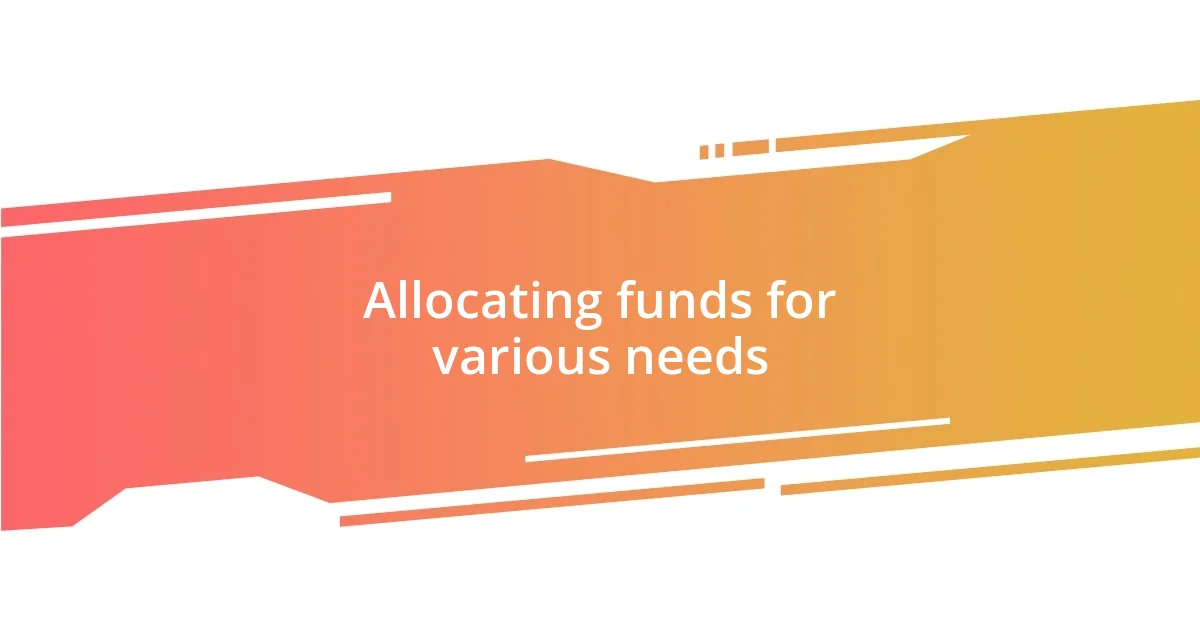
Allocating funds for various needs
Allocating funds effectively across various needs can be quite a balancing act. I recall managing a grant for a community project, where I had to decide how much to allocate for resources versus outreach efforts. It’s a bit like piecing together a jigsaw puzzle; each piece must fit perfectly to see the entire picture. I often ask myself, “How does each allocation propel the project forward?” This reflection guides my decisions.
When looking at expenses, I prioritize by assessing the immediate needs versus long-term goals. During one project, I realized that investing more in quality materials at the start resulted in fewer repairs down the line. Have you ever found yourself skimping in one area only to pay for it later? By recognizing where it’s smart to spend a little extra upfront, I transformed my budgeting from being reactive to being strategic.
Collaboration with my team has also been integral in this process. I remember a brainstorming session where everyone shared their insights on what resources they truly required. This discussion not only highlighted overlooked expenses but also fostered team cohesion. I’ve discovered that the more perspectives I gather, the more accurate my budget becomes. It’s amazing how much I learn when I ask, “What do you think we truly need to succeed?”
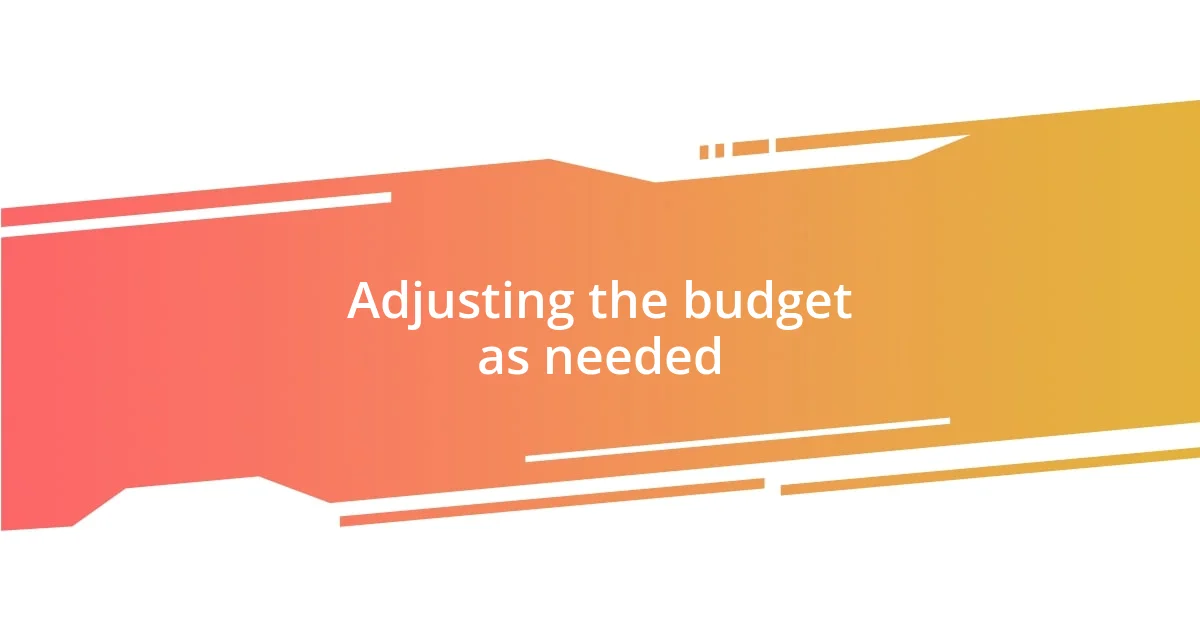
Adjusting the budget as needed
Adjusting a budget isn’t just about making cuts or reallocating funds; it’s about responding to the reality of project demands. I remember a time when a sudden opportunity arose to collaborate with a local organization halfway through my grant cycle. It was tantalizing, but it required funds I hadn’t originally earmarked. So, I took a deep breath, re-evaluated my budget, and shifted some allocations to capitalize on this unexpected chance. It turned out to be a worthwhile gamble.
Sometimes, unexpected challenges can derail even the best-laid plans. I recall a project where essential supplies were delayed, creating a temporary halt. Instead of panicking, I decided to adjust my budget to cover alternative resources while waiting. This flexibility allowed my team to stay productive, and we ultimately met our deadlines. Have you faced similar hurdles? Being adaptable and thinking creatively can often turn a potential setback into a stepping stone.
Communication is critical during these adjustments. I’ve found that regularly updating my team about budget alterations ensures everyone is on the same page. Early in my grant management journey, I neglected to inform team members about minor changes, leading to confusion and misaligned expectations. Now, I make it a point to share updates and solicit feedback. It’s amazing how a quick check-in can create a sense of shared ownership and commitment. Have you ever noticed how little adjustments in communication can lead to big changes in team morale?
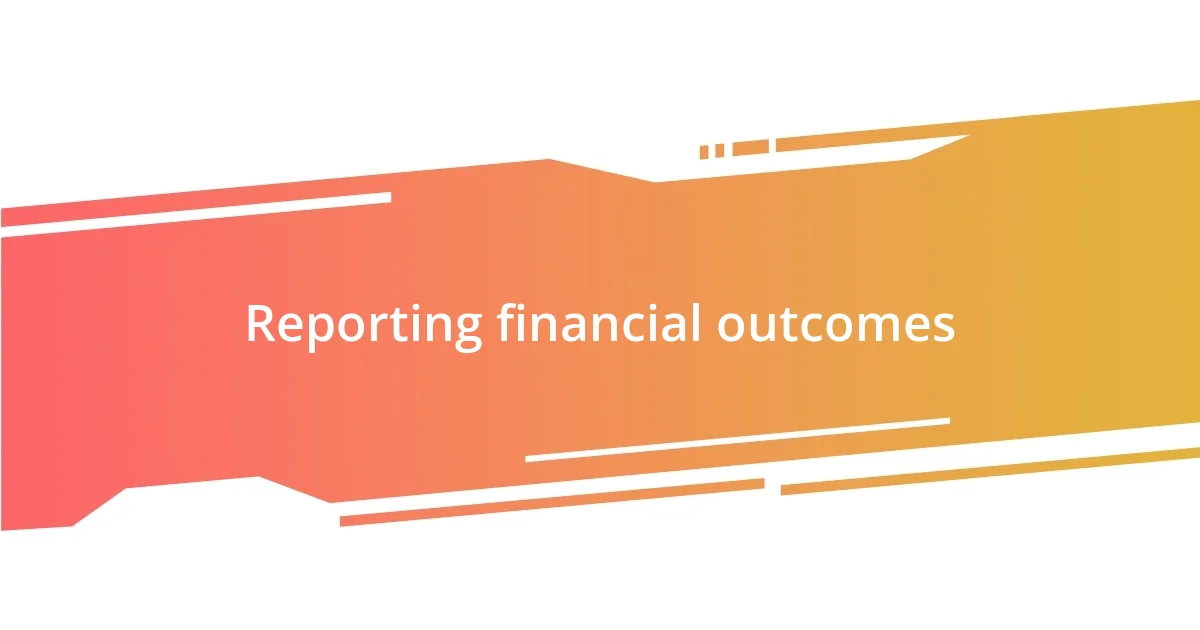
Reporting financial outcomes
Reporting financial outcomes is a crucial part of grant management, and from my experience, it’s all about clarity and transparency. I remember preparing a report for one of my grants where I meticulously detailed every expenditure. As I presented it, I felt a mix of pride and vulnerability—showing the numbers felt like exposing my project to scrutiny. Yet I realized this transparency fostered trust and opened up valuable discussions about future funding.
One time, after sharing the financial report, a funder expressed concerns about certain expenses. Instead of feeling defensive, I welcomed the feedback and took it as an opportunity to explain my reasoning behind those choices. This interaction not only clarified my spending rationale but also highlighted areas where I could improve moving forward. Have you ever turned what felt like criticism into constructive dialogue? That’s a powerful skill that can enrich your project and strengthen relationships with stakeholders.
Regularly tracking and reporting financial outcomes also enhances accountability within the team. I once introduced a simple spreadsheet for my colleagues to record their expenses, and it transformed our approach. No longer were we fumbling at the end of the quarter; the ongoing tracking made us more proactive. Have you experienced that same shift in mindset when you visualize your financial data? It’s intriguing how real-time updates can keep us on our toes and engaged in the project’s financial health.
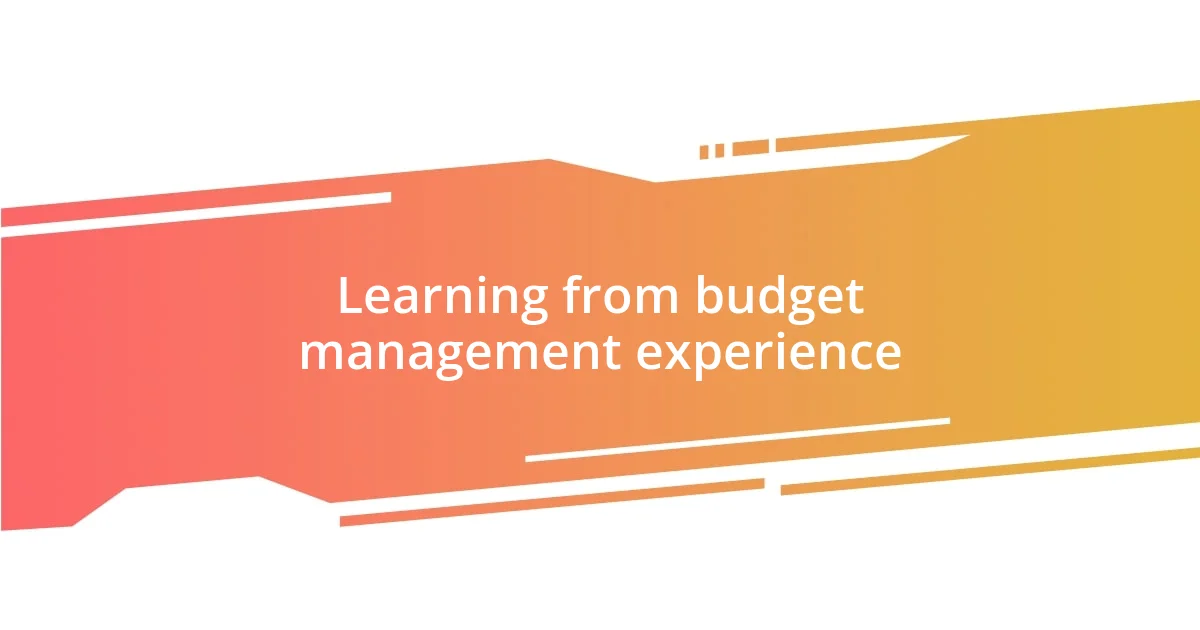
Learning from budget management experience
Learning from budget management can be one of the most insightful experiences in grant management. I fondly recall a project where initial estimates fell short, leading to unforeseen expenses. At first, it felt overwhelming, but as I navigated through it, I realized the importance of detailed planning combined with ongoing assessment. Have you ever felt the pressure of tight finances? It’s a reminder that budgets aren’t static; they need constant refinement based on real-life performance.
During a particular project, I switched to a monthly review system for our budget, and it was eye-opening. I discovered that minor tweaks made a significant difference. For instance, reallocating just a small amount each month to address spikes in project costs kept us on track. The best part? It fostered a culture of vigilance and engagement among the team. Have you noticed how shared responsibility can amplify dedication? It was a lesson in collaborative ownership that I cherish.
I’ve also learned that setbacks often become the best teachers. In one instance, facing a shortfall made us rethink our priorities and focus on the most impactful activities. This shift not only strengthened our project but also sharpened our financial acumen. Have you experienced a similar turning point? That ability to adapt and pivot in response to budget realities is invaluable and shapes how we approach future projects.










